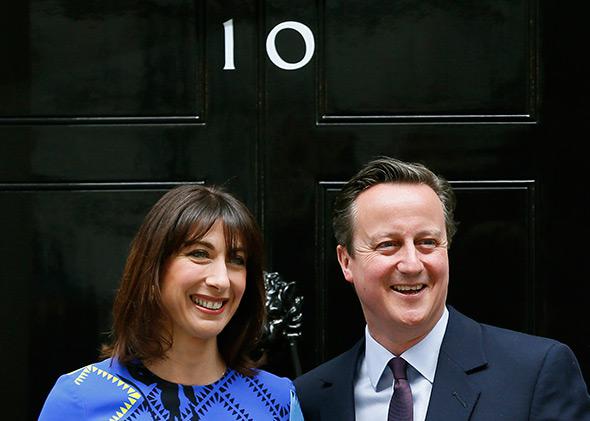CAMBRIDGE, England—It seemed inconceivable. At 10 p.m. last night, as voting ended in the British general election, the nation’s broadcasters made a dramatic announcement. The exit polls showed that David Cameron’s Conservative Party would be returned to office with increased strength, while the Labour Party’s power would be shattered. After months of election projections showing the main parties deadlocked in a neck-and-neck finish, the final poll said something utterly different: British voters want Conservative rule.
The evening’s gradual revelations didn’t go down easily for those on the losing end. The first party proxies interviewed on the BBC rubbished the exit poll—former Liberal Democrat leader Paddy Ashdown said he’d eat his hat if his party did as badly as projected, and longtime Labour apparatchik Alastair Campbell said he’d chew on his kilt if the poll was right. Apparently, Britain will soon see a boom in textile consumption, because the poll’s failure was that it grossly underestimated the scale of the Conservatives’ success and the collapse of Labour and the Lib Dems. In the last general election, in 2010, no party won a majority, so the Tories governed in a coalition with the Liberal Democrats. In 2015, in an unusual development in British politics, a party of government increased its representation in Parliament. David Cameron will remain as prime minister, but this time, the Conservatives will govern with a majority.
Doubts about the exit poll soon faded as the results started to trickle in. The Scottish Nationalist Party really did turn the map of Scotland yellow, taking 56 of the country’s 59 seats, 50 more than it held in the last Parliament. Now Britain’s three main parties each have just one MP north of the border. With just a couple of constituencies left to report, it looks like Labour will be 25 seats down, while the Liberal Democrats lost 48 seats and are currently reduced to eight MPs, a stinging rebuke for the party’s time in coalition. And while nationalists won big in Scotland, they didn’t have a similar breakthrough in England and Wales: The U.K. Independence Party lost one of its two seats, and Plaid Cymru, the Welsh nationalist party, remains stuck on three.
What does this mean?
Ironically enough, while Britain made a clear choice and gave one party an unequivocal, if narrow, parliamentary majority, there is uncertainty ahead. In an attempt to quiet UKIP’s anti-European Union braying, not to mention the complaints of “Eurosceptics” in his own Conservative Party, Cameron promised to hold an in-out referendum on EU membership before 2017. So while Britain’s business community usually supports the Conservatives, the possibility of exiting the European Union has a lot of businesspeople spooked. Similarly, even though the nationalists lost last fall’s Scottish independence referendum, having gained such a clear mandate in Scotland, the SNP would be justified in pushing for another vote to break up the union, which would mean even more instability.
The bizarre results in Scotland, where some seats saw swings of up to 39 percent from Labour to the SNP, have more people mumbling about the merits of proportional representation. In a 2011 referendum, Britons rejected a switch from the “first past the post” system familiar to Americans, to an “alternative vote” method. That question may come up again in light of the Scottish results: Although they won 50 percent of the votes in Scotland, the SNP now has 95 percent of Scotland’s representatives in Westminster. Or put another way: Having gained just 4.8 percent of the U.K. vote share, the SNP will have 56 seats in Parliament, while UKIP, which won 12.7 percent of the nation’s votes, will have just one. Of course, the Liberal Democrats have been underrepresented in Parliament for generations, relative to their percentage of the overall vote, but now that the major parties have all suffered in Scotland, they may have second thoughts. The Conservatives have long opposed proportional representation, in recent years because of worries that it would cost them seats to UKIP. But UKIP’s charismatic leader, Nigel Farage, has stepped down after failing in his bid to win a seat in Parliament, which means the insurgent party is likely to lose support in the coming years.
When British parties fare poorly in general elections, their leaders are expected to fall on their sword. Labour’s Ed Miliband, the Liberal Democrats’ Nick Clegg, and UKIP’s Farage have already offered their resignations. Unusually, however, because Thursday’s results contained so many upsets, none of these parties has an obvious successor waiting in the wings. Labour suffered some high-profile losses, including Miliband’s great rival, shadow chancellor Ed Balls, and the party’s spokesman on foreign affairs, Douglas Alexander, who lost his seat to a 20-year-old college student standing for the SNP. The Lib Dems did even worse—nearly all the party’s MPs, including former leaders and several who held important jobs in the most recent Cabinet—lost their seats.
In the run-up to the vote, every single poll was wrong. With the press currently focusing on the electorate’s rejection of Labour, the evisceration of the Lib Dems, UKIP’s underperformance, and the SNP’s mighty victory, the polling companies will soon have a lot of ’splaining to do. One company has already admitted that it didn’t publish the results of a poll conducted the day before the election because it seemed “out of line” with the rest. By failing to disseminate the results, it, too, lost a chance to be a big winner on one of the most startling British election nights in memory.
